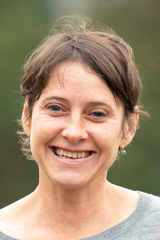On this page:
Jackie Chi Kit Cheung
Marie-Helene Boudrias | Cynthia Kallenbach
Winner
Jackie Chi Kit Cheung, School of Computer Science
“I develop individualized plans for each of my mentees tailored to their current level of training and research interests, as well as to help address issues related to equity, diversity, and inclusion.”
Biography
I am an associate professor in McGill University's School of Computer Science, co-directing the Reasoning and Learning Lab. I am a Canada CIFAR AI Chair and an Associate Scientific Co-Director at the Mila Quebec AI Institute. My research in natural language processing focuses text generation and computational pragmatics, with applications to domains like health and language revitalization. My research is motivated by how the structure of the world can be reflected in the structure of language processing systems. Alumni from my research group have taken faculty positions in academia and research positions in top industry labs.
Approach to graduate supervision
The opportunity to supervise graduate students is one of my primary motivations to be a faculty member. My approach to student training centers on the fact that students are unique and require a tailored approach. I develop individualized plans for each of my mentees tailored to their current level of training and research interests, as well as to help address issues related to equity, diversity, and inclusion. I strongly encourage students from under-represented groups to apply to my research team. To help combat unconscious bias, I conduct recruitment interviews in a structured format with pre-planned questions, usually around a discussion of a research paper. During recruitment, I convey my philosophy that high-quality research is compatible with and indeed facilitated by a caring and supportive environment. I view the PhD program as an extended apprenticeship. In addition to discipline-specific knowledge, I aim to impart PhD mentees with critical thinking ability, presentation skills, and a long-term vision that allows them to develop into full-fledged scientists and scholars. I encourage my students to build their own research identities as members of the community in their own right.
Testimonials
Prof. Cheung is a very inspiring and supportive supervisor. What I appreciate most about his research philosophy is that publication is not the focus -- conducting solid and meaningful research is. This philosophy allowed his students to keep sight of the bigger picture, even in the rapidly evolving and competitive atmosphere of AI research. It also made him a supervisor who cares deeply about the process and what his students learn from it.
He is also very open-minded, welcoming different perspectives and ideas, sometimes even from other disciplines. When he is unfamiliar with a topic, he is motivated to learn about it and to learn from it to improve practices in our field of research. It is his attitude towards continual learning, towards interdisciplinary research and towards novel ways of doing research that inspired me to adopt the same mindset.Yu Lu Liu, MSc student,
School of Computer Science, McGill University
I don’t like the use of the word “supervisor” in graduate school as it takes away the human element of the supervisor-student relationship. Jackie was not a supervisor, he was an advisor, a mentor, a guide and a friend. He rooted for my success every step of the way and pushed me forward when he saw that I was having a good momentum, but he also gave me space when he felt I needed it and reminded me what PhD students tend to forget: we are more than our research. Through it all, Jackie showed me over and over that he cared about my personal well-being and my success inside and outside my PhD. One important trait of my relationship with Jackie, which I hope I’ll be able to emulate one day with my own students, was openness and transparency. Jackie has such a kind, friendly and down-to-earth character that it was very easy for me—and I believe everyone in our research group—to approach him with whatever I had on my mind, to be frank and open about obstacles and struggles in my research and, more generally, about wishes or expectations I had for our supervisor-student relationship.
Jad Kabbara, Postdoctoral Researcher,
Massachusetts Institute of Technology
Nominees
 Marie-Helene Boudrias, School of Physical and Occupational Therapy
Marie-Helene Boudrias, School of Physical and Occupational Therapy
“I firmly believe that the contribution of graduate students is central to innovation.”
Biography
I am a neuroscientist, physiotherapist, and Associate Professor in the School of Physical and Occupational Therapy of the Faculty of Medicine and Health Sciences at McGill University. My research interests are focused on quantifying brain networks and identifying biomarkers of motor and cognitive functions during aging processes using the newest advances in neuroimaging and neurophysiological techniques as well as in signal processing. I am also studying the brain mechanisms supporting the effectiveness of neurorehabilitation interventions such as brain stimulation and music on brain plasticity and functional recovery after stroke. More recently, I have been interested in the impact of COVID-19 on the brain and on the delivery of rehabilitation services.
Approach to graduate supervision
As a graduate supervisor, I have the privilege and opportunity to guide the next generation of clinicians and researchers. I firmly believe that the contribution of graduate students is central to innovation. Aiding my students in expanding their research and complementary skills, advancing their career paths, and successfully designing and implementing innovative research projects represent important priorities for me. My role is not only to share and impart knowledge and support the development of key skills but also to inspire my students’ critical thinking, creativity, and independence. As a mentor, my aspiration is to cultivate in them a love for learning, a passion for knowledge, and a genuine joy of discovery.
Testimonials
Prof. Boudrias was an outstanding supervisor and mentor who consistently demonstrated a genuine commitment to the academic and professional success of the graduate students involved in her lab. She possesses an exceptional ability to engage and challenge students, fostering an environment that develop critical thinking and encourages excellence. Moreover, she has an extraordinary enthusiasm that enhance graduate students’ motivation and support. She takes a hands-on approach to mentorship, guiding students through the research process and helping them make timely progress towards graduation. The mentorship of Prof. Boudrias was pivotal since in early 2018, I obtained an academic position at the School of Kinesiology and physical activity science at University of Montreal; I owe her a lot in this career achievement because she offered me outstanding opportunities to establish as an independent researcher.
Fabien Dal Maso, Associate professor
École de kinésiologie et des sciences de l’activité physique, l'Université de Montréal
In addition to creating a challenging academic environment, Dr. Boudrias demonstrated a keen ability to motivate and support her trainees in their research, even during challenging times. She provided unwavering support, guiding me through research projects that involved a unique blend of machine & deep learning skills alongside domain knowledge in neuroimaging. Dr. Boudrias has not only excelled in academic mentorship but has been a driving force in shaping my academic and professional journey. Her dedication to creating an enriching academic environment, coupled with unwavering support for ambitious research endeavors and a commitment to fostering professional growth played a pivotal role in creating a profoundly rewarding scientific experience that, in turn, fueled my decision to pursue a career in academia.
Arna Ghosh , PhD candidate
Computer Science | Mila Quebec AI Institute and McGill University
 Cynthia Kallenbach, Natural Resource Sciences
Cynthia Kallenbach, Natural Resource Sciences
“The moment in supervision that I most appreciate is when students ‘go rogue’ and go down their own path and urge me to think about our research from a new angle.”
Biography
My research is in soil ecology and biogeochemistry. I am an Associate Professor in the Natural Resource Science Department where I lead a research team investigating how land use and global change affect soil microbial communities and their impacts on soil organic matter and nutrient cycling. I completed my MSc at UC Davis with Will Horwath, my PhD at the University of New Hampshire with Stuart Grandy, and a postdoc at Colorado State University with Matt Wallenstein and Meagan Schipanski. I am enormously grateful that each of my mentors created supportive, open learning environments that challenged and inspired me.
Approach to graduate supervision
My approach to mentoring is to provide students with a positive, supportive, and rigorous environment, with regular and transparent dialogue and I try to adapt my mentoring to the strengths of each individual. I discuss with my student the value of creativity in science and encourage them to stretch their creative muscles. The moment in supervision that I most appreciate is when students ‘go rogue’—when they have the foundational knowledge and experiences to give them the confidence to go down their own path and urge me to think about our research from a new angle. I cultivate this but provide soft boundaries and checks so they do not stray too far from their goals. I make sure students know that setbacks are common in research and that they can trust me to help them learn how to navigate these challenges and find resolutions. Ultimately, I try to be my students’ biggest champion, and it is important to me that they feel part of a collaborative team that they trust, feel inspired by, and with whom they can celebrate both the small and big successes.
Testimonials
Cynthia is one of those rare professors who is both incredibly gifted and creative in their research, while also being deeply kind and supportive of their students. I’ve always felt that Cynthia is genuinely supportive of my success, not just as her student, but as my own person. My thinking and understanding of my research field and the philosophy of science in general has grown immensely since starting my PhD, and Cynthia has been instrumental in that growth. She challenges me to think creatively and deeply about my research questions. However, the most important support that Cynthia has provided me hasn’t been when I’ve been at my best, but rather when I’ve been struggling through my worst. She has been steadfast in her support for me; I’m not sure that I would still be in my PhD program, let alone thriving, if not for her compassionate support and encouragement.
Jessica Nicksy, PhD candidate,
Soil Ecology and Biogeochemistry Lab, Natural Resource Sciences, McGill University
 This work is licensed under a
This work is licensed under a 